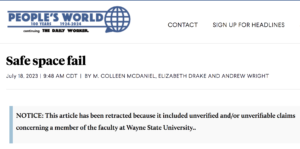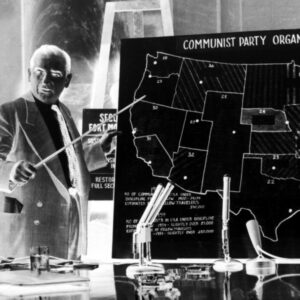COMPLETE RETRACTION!
I write this entry at a moment of reflection, ten years after being asked to write a series of weekly articles as guest poet/critic for the online journal Jacket2. This was offered and accepted in good faith; I would gladly accept such a task in a minute, any time. Somewhat at a loss for where to begin, I took up the question of “presentism” in relation to the state of the present that was most compelling at the moment—a grim January freeze in Detroit, with its attendant affective states. This was ironic, as the distinction between presentism and historicism I was engaged in thinking through was propelling me toward the essays collected in Questions of Poetics—for some of my use of the term, click here. Let’s say the “presentism” at the moment was history at a standstill, wondering which way it would go—and what the consequences would be. Those consequences, it turned out, were immediate—a three-ring circus of attacks by designated officers of the poetic Left. Here, I am not naming names—but the triumvirate was ready and took the opportunity to stage a bloody attack on my public stance in the discourse of poetics.
All of that is available in the thread of articles that I cite—now ten years on. In the meantime, the triumvirate achieved a measure of prominence in poetics, with a flagship press and some estimable titles. But what was the necessity of the intellectual violence—as such it was? An obvious explanation was that “Language writing” was under scrutiny for failing the charge of “social justice.” This would be a staging for the tumult that would take place only a year later, with the attack on conceptual writing, the outing of Kenneth Goldsmith and Vanessa Place, the canceling of a conference at Berkeley. I posted on that moment too, and only dug a deeper hole. One thing led to another; this ideological debacle in poetics has continued even as world events have caused even greater schism and anomie: thus a theory of “reflection,” let us say. Another theory, however, is that the withering attack on my more-or-less innocent op-eds for Jacket2 represented a more basic drive—something between political opportunism and a kind of transpersonal envy that cancels out anything like a political will. In other words, the move from assumed collectivity to calling out is simply a moment of destruction—a form of asociality that says more about what is happening in our “distressed present” that any positive claim. As I rehearsed it in my post in 2014:
Naming names, of course, is a politics from the days of the anti-Communist witchhunts. Suspected or identified communists were called up before congressional committees, their rights to due process suspended, and then were asked to name those with whom they were in cells, saw at meetings, or merely knew. The concept of “fellow traveler” had a particular use in characterizing those who were not members of a given organization but who were associated with it. By means of these tactics, the broadest interpretation of what it meant to be a communist, a communist sympathizer, or fellow traveler could be created, one that had a massively chilling effect on cultural politics at the time. With the downfall of the witchhunts, the tactic gradually lost force, though loyalty oaths and other tests of political acceptability remained. The practice had an immediate effect on the politics of poetry: it worked to entirely surpress the literature of the Popular Front and much of the Harlem Renaissance in the 50s, when the New Critics and conservative modernists had their sway. Any number of individuals were directly affected by this climate (whom I would name but for my attempt to write, here, without naming names). The history has not yet been written that accounts for the cultural damage these kinds of broadly targeted smear campaigns created. (From “On Naming Names”; here)
Recently, I have found, it has happened again—has happened, is happening, will happen. It is a recurring loop. The particular names will be withheld, and for the moment the context. Simply, I am looking back at the history I have been in and am wondering: “Am I that name?” Another frozen January comes around with a feeling of something like standing still. But there is also an interesting difference here. In 2014, I was writing on the strategies of using names in poetry, from the New York School to Conceptual writing to social justice poetry. None of these examples were McCarthyite. Thinking the issue through had more to do with how the collective politics of Occupy (2011), paralleled the completion of the collectively authored Grand Piano (2010; public readings through 2011)—both exploring a poetics of the “name.” This later politics would soon be more about exclusion rather than inclusion, with the full-blown development of “call out culture” to come.
Notes
Image: reverse photo of Sen. Joseph McCarthy, naming the dangers of communism, c. 1950.














